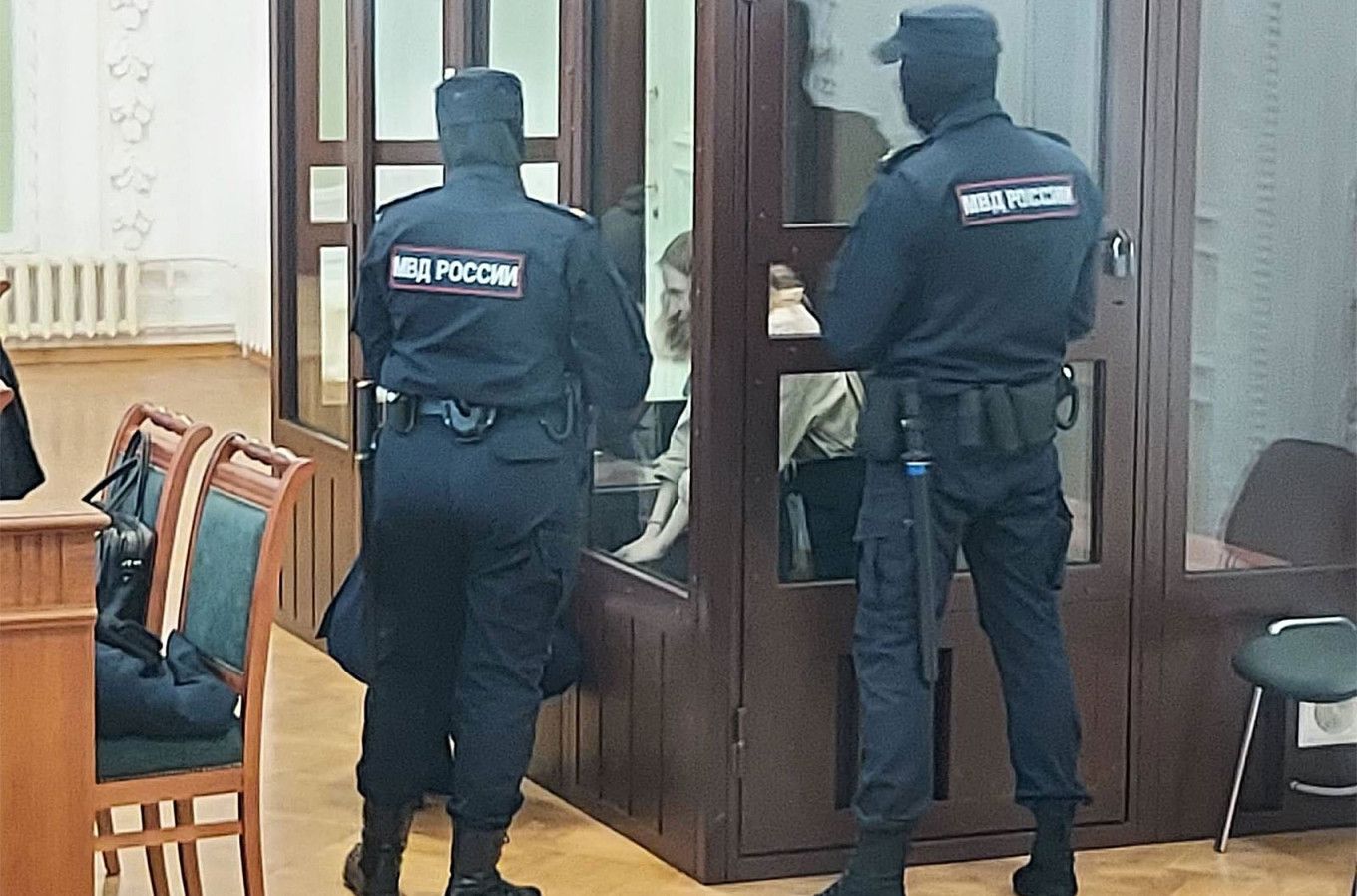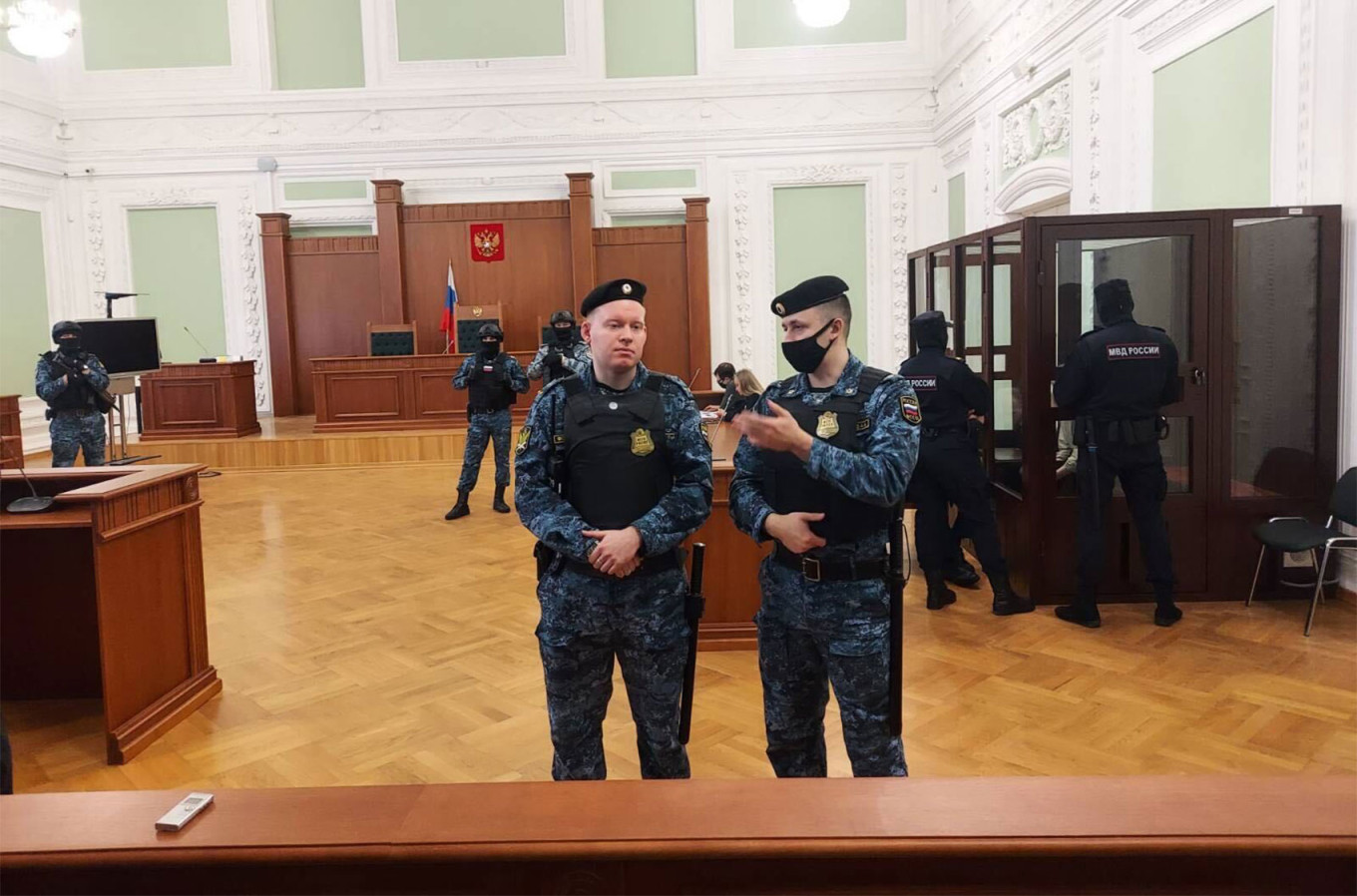ST. PETERSBURG, Russia — “I feel pain and shame that my naivety and gullibility led to such catastrophic consequences.”
As Daria Trepova gives her final word in court, two policemen stand in front of the glass cage for defendants, obscuring her from view.
“I still don’t plead guilty but I acknowledge my moral responsibility,” the 26-year-old continues, her voice breaking from tears.
Trepova faces 28 years in prison for the murder of prominent pro-war blogger and propagandist Maxim Fomin, better known as Vladlen Tatarsky.
When her sentence is handed down Thursday, she is widely expected to receive a lengthy prison term in what her family and other observers have called disproportionately severe even by Russia’s standards.
On April 2, 2023, Trepova gifted Tatarsky a golden bust of himself while he spoke at an event in a St. Petersburg cafe popular among ultranationalists and pro-war figures. An explosive device hidden inside the statuette went off a few minutes later, killing Tatarsky and injuring over 50 people.
Tatarsky, a convicted bank robber turned pro-Russian rebel in eastern Ukraine’s Donetsk region, had been an ardent supporter of the invasion of Ukraine.
Investigators claim Trepova acted on the instructions of individuals located in Ukraine. She was subsequently charged with terrorism, illegal trafficking of explosive devices and illegal document forgery.
Trepova, who opposes the war in Ukraine, says she did not know that a bomb was hidden inside the bust. She pleaded guilty to the document forgery charges while maintaining her innocence regarding the other two charges.
A former medical student at St. Petersburg State University, Trepova is reported to have attended Russian opposition events before Tatarsky’s killing but otherwise led a private life. When Russia invaded Ukraine on Feb. 24, 2022, she and her husband Dmitry Rylov were detained at an anti-war rally in central St. Peterburg.
According to Trepova’s version of events, she acted on the instruction of Russian opposition journalist Roman Popkov and an individual using the alias Gestalt.
The two promised to help her move to Ukraine, where she wanted to work as a volunteer. In exchange, they assigned her small tasks like buying SIM cards and attending Tatarsky’s events.
In Trepova’s testimony, she said she agreed to deliver the bust to Tatarsky after she was told it contained a listening and tracking device.
“I was always sure that there was just a microphone in the bust,” she said in her final word on Monday.
“In reality, I was sent with a bomb to my death.”
The state prosecutor dismissed Trepova’s account and asked the court to sentence her to 28 years in a medium-security prison colony and pay an 800,000 ruble ($9,100) fine.
As the prosecutor noted, Trepova appears visibly nervous and tries to distance herself from Tatarsky after handing him the bust in video footage of the event.
“Even if she wasn’t 100% aware [of the hidden bomb], she guessed it for sure,” Gennady Sopyan, 58, who was severely wounded in the blast, told The Moscow Times. A scar is still visible on the top of his head. He says some of the fragments of shrapnel are still stuck in his skull.
The defense argues that Trepova sat near Tatarsky before the blast and did not attempt to escape, indicating that she may not have been aware of the explosive device.
“I think she was sure that as long as she was next to the bomb, they wouldn’t activate it,” said Marat Armis, a local journalist whose right ear was injured in the blast and who believes Trepova acted with intent.

The victims have filed civil claims totaling about 50 million rubles ($568,500) for moral and property damage. Trepova, who denies the claims because she pleaded not guilty to carrying out the attack, said she would try to privately compensate the victims.
“There are enough blank spots and unresolved doubts in the case,” Trepova’s lawyer, Daniil Berman, told reporters following the hearing.
“The material collected in the case [by the investigator] objectively and clearly shows that my client is absolutely not guilty of the terrorist attack,” said Berman, who insists that the case be returned to investigators.
The other defendant on trial, Dmitry Kasintsev, 27, faces one year and 10 months in jail for harboring Trepova, whose husband is an acquaintance of his, in his apartment after the cafe bombing.
Russian authorities accuse Ukraine’s security services of orchestrating Tatarsky’s assassination. Kyiv has not officially commented on the attack, but Mikhailo Podolyak, adviser to President Volodymyr Zelensky, said the attack was a result of Russia’s internal turmoil.
Since the start of Russia’s full-scale invasion, Kyiv has rarely claimed responsibility for attacks on Russian soil, instead linking them to alleged Russian partisans fighting Putin’s regime.
The Federal Security Service (FSB) has charged Yury Denisov, a Ukrainian citizen, for plotting Tatarsky’s assassination.
According to the authorities, Denisov entered Russia from Latvia to collect information about the military blogger and delivered the bomb statuette to Trepova.

Popkov, a former member of the ultranationalist, now-banned National Bolshevik Party, is also wanted in Russia for organizing Tatarsky’s assassination and was added to a “terrorists and extremists” registry last May.
He previously admitted being in touch with Trepova via social media but denied any involvement in the attack.
In a recent post on X (formerly Twitter), Trepova’s husband Dmitry Rylov accused Popkov of using his wife as a “walking bomb” and demanded he confess to tricking Trepova into delivering the bomb. Rylov said he hoped this statement could help his wife’s sentence be reduced.
Popkov replied in a Telegram post that he didn’t intend to reveal the details of the “operation” until “victory over evil” — an apparent reference to President Vladimir Putin’s regime — was achieved.
When asked by The Moscow Times whether he took part in Tatarsky’s assassination, Popkov refrained from a direct answer but admitted to being part of the organization behind the attack, which he called “the Russian anti-Putin resistance.”
He also denied that the Ukrainian government was involved in the killing.
“I am now 100% sure that he and other people literally sent Dasha to her death,” Rylov said when shown Popkov’s reply.
The 28-year sentence requested for Trepova is widely considered to be an extremely harsh punishment.
“This is an incredible blow for me personally,” Rylov said of the prosecutor’s requested sentence. “I was expecting the jail term would be long, but I wasn’t expecting something that bad.”
Eva Levenberg, a criminal lawyer at the OVD-Info human rights project, said that there are few precedents for such terms and that they are usually handed to people who had “the most active role and involvement in committing a crime.”
“It is a very serious punishment even by Russian standards.”
… we have a small favor to ask.
As you may have heard, The Moscow Times, an independent news source for over 30 years, has been unjustly branded as a “foreign agent” by the Russian government. This blatant attempt to silence our voice is a direct assault on the integrity of journalism and the values we hold dear.
We, the journalists of The Moscow Times, refuse to be silenced. Our commitment to providing accurate and unbiased reporting on Russia remains unshaken. But we need your help to continue our critical mission.
It’s quick to set up, and you can be confident that you’re making a significant impact every month by supporting open, independent journalism. Thank you.